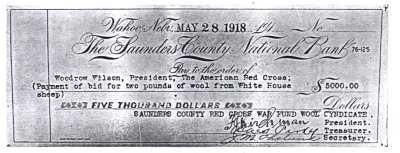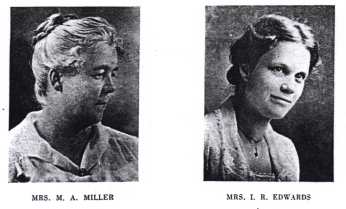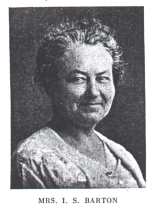|
White House Wool
$2,500.00 a pound for wool!
This was the mark set by a number of patriotic citizens of Wahoo for the White House wool, and it must be a source of gratification and pride to every soldier and sailor from Saunders County to know that these citizens set a record price for the White House wool, thereby contributing $5,000.00 for Red Cross war work by the purchase of two pounds of wool sent by President Wilson to governor

of Nebraska. It will be recalled that the President had a number of sheep feeding upon the White House lawn, and that in the spring of 1918 they were shorn of their fleece, of which there was sufficient to send two pounds to the governor of each of the forty-eight states in the Union, with the request that the same be sold at auction on May 27, 1918, at the various state capitols, the proceeds of such sales to be given to the Red Cross War Fund Committee.
The day before the auction was to take place Mr. F. J. Kirchman, the very patriotic and efficient chairman of the Saunders County Red Cross War Fund Committee, called a number of representative citizens to his office. Among those present and who conferred with him were Dr. E. O. Weber, Ex-Senator E. E. Placek, Judge Chas. H. Slama, and Mr. Charles Perky, and it was readily and unanimously determined by these patriotic men to purchase said wool for Wahoo.

The next morning Judge Slama went to Lincoln with instructions to bring the wool home, bidding, if necessary, as high as $10,000.00.
When he called at the governor's office the bidding list was exhibited to him. The first bid the governor had received was one of $330.00 from North Platte, and the next and the then highest bid was $400.00 made by W. B. Shurtleff, of Lincoln. He left the office without any comment.
The auction was to remain open until midnight. Late in the afternoon Judge Slama returned, and the first thing he did after learning that $400.00 was still the high bid was to raise it to $500.00. There it remained for a short time. Then E. G. Bohannan, of Lincoln, acting for a bunch of nearly half a hundred Lincoln business men, telephoned to the governor's office and inquired about the situation and boosted Slama's bid to $800.00. Judge Slama then came back with an offer of $1,000.00. Then everybody quit until after supper.
Chief Clerk Currie of the governor's office, who had charge of the bids, advised the bidders that they could reach him during the evening at his home in Havelock. The Lincoln bidders soon thereafter made an offer of $1,100.00 and let it be known that they were prepared to go much higher if necessary. Then evidently intending to scare Judge Slama they promptly raised their own bid to $1,340.00. Feeling that they had gathered some wool the Lincoln syndicate awaited for further developments.
Judge Slama remained at his hotel. He did not know just what the Lincoln group had up its sleeve and he didn't want to take any chances. He called up Mr. Kirchman who was with Dr. Weber and Senator Placek in his office to remain there until after midnight awaiting results. Mr. Kirchman was informed of the maneuvers of the Lincoln crowd, and a hasty conference at the bank resulted in Judge Slama being told to bid that wool in and to go as high as $20,000.00 if necessary.
Calling Mr. Currie shortly before midnight, he was informed that the highest bid was that of the Lincoln crowd of $1,340.00 . He raised that bid to $2,000.00. Currie then called up Messrs. Bohannan and Shurtleff, spokesmen for the Lincoln group, and gave them another chance. While they were conferring Judge Slama decided to go the limit. "We want that wool to put into the court house at Wahoo," he told Mr. Currie over the telephone. "A little matter of a few thousand dollars makes no difference to Wahoo, and I will just make the bid $5,000.00 for the two pounds of wool." The Lincoln contingent was completely outclassed by this development.

Judge Slama's $5,000.00 bid was made just as the hour was striking twelve. The Lincoln spokesman didn't have the nerve to increase it, and long before they could confer with the rest of the group the hammer fell and the two pounds of wool was auctioned off to Judge Slama for $5,000.00. In this it might be interesting to know that five minutes to midnight some citizens from Shubert called up the governor's office and put in a bid of $200.00 for the wool. Undoubtedly they sent this bid in without having heard about the bidding developments up to that time.
The Nebraska White House wool brought the highest price of all that was sent to the various states. Boston made a great splurge in the Eastern dailies on the fact that it bid $2,000.00 for the wool. This splurge they made under the wrong assumption that no state would possibly bid any higher, and Boston must have felt somewhat uncomfortable to find that little old Wahoo, way out on the western prairies, outclassed it two and one-half to one.
The following citizens of Wahoo and vicinity made the following contributions that made up the $5,000.00 bid:
Saunders County National Bank. . . . $300.00
First National Bank, Waboo . . . . . 300.00
Citizens State Bank . . . . . . . . . 200.00
Nebraska Culvert & Mfg. Co. . . . . . 200.00
D. R. Phelps Lumber & Coal Co. . . . 200.00
F. J. Kirchman . . . . . . . . . . . 200.00
Chas. H. Slama . . . . . . . . . . . 200.00
John Dolezal . . . . . . . . . . . . 200.00
Farmers' Co-operative Co. . . . . . . 200.00
Killian Bros. Co. . . . . . . . . . . 200.00
Smith-Hultin-Andersons Co. . . . . . 200.00
Frank Dolezal. . . . . . . . . . . . 200.00
Winter Bros . . . . . . . . . . . . . 200.00
Christian Scow . . . . . . . . . . . 200.00
D. H. Mills . . . . . . . . . . . . . 200.00
E. O. Weber . . . . . . . . . . . . . 100.00
F. & M. State Bank . . . . . . . . . 100.00
Annie Scow . . . . . . . . . . . . . 100.00
Fred McCreery . . . . . . . . . . . . 100.00
J. F. Gross . . . . . . . . . . . . . 100.00
C. E. Tornblom . . . . . . . . . . . 100.00
Alf. Helsing . . . . . . . . . . . . 100.00
R. J. Woodworth . . . . . . . . . . . 100.00
Wm. J. Vlcek . . . . . . . . . . . . 100.00
J. E. Vlach . . . . . . . . . . . . . 100.00
Elmer Johnson . . . . . . . . . . . . 100.00
Wahoo Democrat . . . . . . . . . . . 100.00
J. F. Lauvetz . . . . . . . . . . . . 100.00
F. E. Way, M. D. . . . . . . . . . . 100.00
B. E. Hendricks . . . . . . . . . . . 100.00
Ed. J. Bredenberg . . . . . . . . . . 100.00
Charles F. Davis . . . . . . . . . . 100.00
Mrs. Dr. M. A. Miller . . . . . . . . 50.00
Mrs. Della Simpson . . . . . . . . . 50.00
________
Total . . . . . . . . . . $5,000.00
Bureau of Supplies
The first department of the Saunders County Chapter of the A. R. C. was the Hospital Supply Department. Because of her efficiency and interest in Red Cross work, Mrs. M. A. Miller was prevailed upon to accept the chairmanship. This department included the purchasing department as well. This was no small task in itself because material was not always available. All purchases of supplies were made from home merchants, when possible, and they were always ready to advise as to best materials, and exerted all their effort to supply materials asked for. Later the chapter was authorized by the central division to buy materials from the Central Headquarters. This eliminated the necessity of a purchasing department, and the secretary took charge of ordering material for quotas.
The supply organization was given a list of articles most needed by Red Cross. Then each branch and auxiliary was given the choice of the articles it would like to make. Thus it was necessary to keep a large stock of materials always on hand

to meet the requirements of the branches, because there was no limit to their output, until June, 1918, when everything was put on a quota basis.
Mrs. Miller looked after the output of all branches, giving out supplies where needed, censoring all garments returned, and superintending the packing and shipping of all garments and knitted goods for shipment to the state warehouse.
In May, 1918, Mrs. Miller found it necessary to resign her position owing to the fact that the family was moving to Montana. At this time the chapter was reorganized, and Mrs. I. E. Edwards was appointed chairman of hospital garments and Mrs. Dan Templeton chairman of the supply department.
The success of the department and the thoroness of its work is largely due to the untiring efforts of its chairman, Mrs. M. A. Miller, who from the very beginning took such an active interest in Red Cross work.
The following letter was received from the Nebraska Inspection Department Warehouse:
"The Nebraska Red Cross Inspection Warehouse is in receipt of three boxes, for which we wish to thank you."
Really the boxes from Wahoo are a delight, when they are opened. Part of the three that were opened by the hospital department were chosen as state samples.
This is indeed a compliment, and I congratulate your women upon their work.
The records on knitting read: "Certainly a lovely box, and congratulations; Saunders County is at the top of our knitting department."
I note the Juniors are beginning to take part, and in this shipment they have made a very good showing.
Thanking you for your co-operation, I remain,
Cordially yours,
Mrs. H. H. BALDRIDGE,
State Censor.
Cutting Department

The cutting of material for the Saunders County Chapter was at first done by the Wahoo branch until the demand became so great that they could not keep up with it. The material was then sent out to the branches, and they did their own cutting. This was found to be very wasteful in the hospital garment department especially.
Miss Klotz, Miss Cook, and Mrs. Stella Thorson appointed themselves a committee to investigate the electric cutting machine installed at Lincoln, and gave a very satisfactory report on it. In fact it was decided after their report that Saunders Chapter could operate more efficiently if they had one.
The money for buying it was obtained by auctioning a rooster donated by Mrs. Miller. The auction was conducted by Col. J. Wernsman and brought $259.00.
The cutting department was organized later with Mrs. Barton as chairman of cutting for hospital supplies, and Miss Cook supervising the cutting of surgical dressing supplies. This proved a great time saver for the chapter and the cutting department. After the machine was purchased it turned out work for every branch of the chapter.
The gauze winding reel made and donated by Mrs. C. A. Gould and Mrs. Carlisle and the reels made by Mrs. Howe were very much appreciated and proved exceedingly useful. They were greatly indebted to the Nebraska Culvert Co. for covering the work table with sheet metal.
| 








